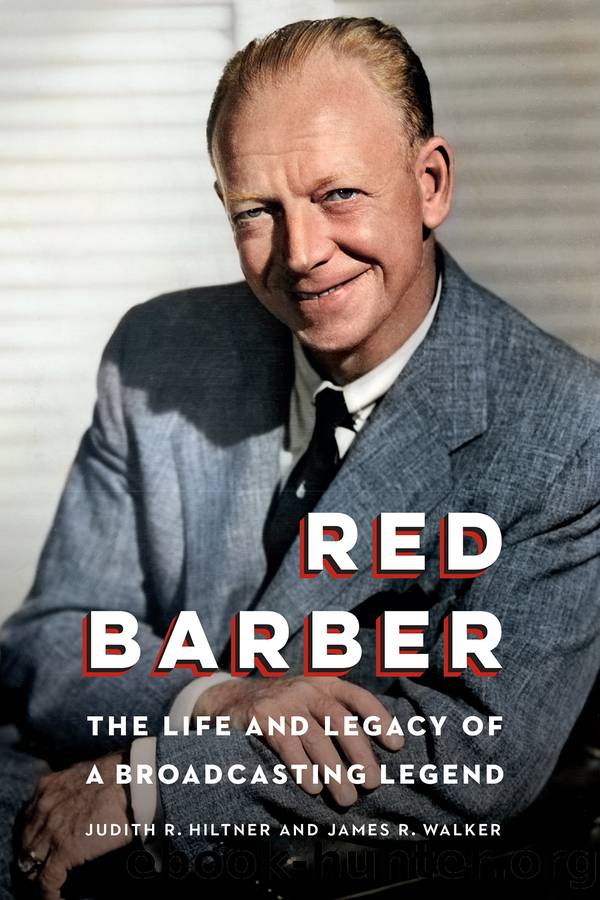Red Barber by Judith R. Hiltner & James R. Walker

Author:Judith R. Hiltner & James R. Walker [Hiltner, Judith R. & Walker, James R.]
Language: eng
Format: epub
Tags: SPO003030 Sports & Recreation / Baseball / History, BIO016000 Biography & Autobiography / Sports, BIO005000 Biography & Autobiography / Entertainment & Performing Arts
Publisher: Nebraska
The Pains and Joys of Drink
Connie Desmond was a lifelong lover of alcohol, and the passion ultimately cost him his career. In his writings, Barber discussed the drinking problems of Bill Munday and Waite Hoyt, describing how their recovery efforts gave Munday a second chance as a broadcaster and Hall of Fame pitcher Hoyt a second career as the voice of the Cincinnati Reds. But Barber appears never to have discussed Desmondâs problem in public. It was likely that he did not want to embarrass his colleague and had persuaded himself that Desmondâs habit was still manageable during their years together in the Dodgersâ booth. Desmond was also a fine announcer, and some fans, although they were a minority, preferred him to Barber. In his interviews with Robert Creamer for Rhubarb in the Catbird Seat, Barber told Creamer that his taped comments about Desmondâs alcoholism should not be in their book: âHis drinking was not a sudden onslaught; it was just finally the ultimate weight that tilted the scales. . . . What possessed him to drink, I donât know, but nobody was going to stop him. . . . He drank up a career and a good one. Desmond in condition was the best fellow I ever worked with. . . . Drank up his family, marriage, everything.â35
One night in St. Louis, Connieâs drinking forced Red to innovate quickly. Desmond and Barber were to do a night game from St. Louis that would be aired on both radio (Desmond) and television (Barber). At the time, televised road games were a rarity and, Red noted, âa big deal. . . . And son of a gun, [Desmond] didnât show up. You keep waiting and you say heâs going to come in the booth any minute.â36 But he didnât and Barber, to protect his colleague, improvised. Tom Villante remembered the moment: âRed was terrific. [He] turned to the engineer and asked, âWill that radio microphone reach in this booth?â The radio mic just made it. So we get on the air and Red opens up with, âToday weâre going to do something brand new; youâre going to love it. Itâs called a simulcast. Iâm going to do radio play-by-play at the same time thatâs going to be the audio for television. Let us know how you enjoy it.â [Barber] made it sound like the whole thing was planned.â37 Desmond finally arrived at the booth in the seventh inning, but he was too late to contribute to the broadcast.
Desmondâs career with the Dodgers ended when Walter OâMalley fired him after the 1955 season. OâMalley gave him repeated chances to reform, more opportunities than Barber would have, but Desmond could not give up his habit.38 Three and a half decades after Barber left the Dodgers, he received a letter from Desmondâs son Jim. The younger Desmond had written the Baseball Hall of Fame asking it to consider his father for the Ford C. Frick Award and wanted Barber to send a letter of support.
Download
This site does not store any files on its server. We only index and link to content provided by other sites. Please contact the content providers to delete copyright contents if any and email us, we'll remove relevant links or contents immediately.
| Baseball | Basketball |
| Boxing, Wrestling & MMA | Football |
| Golf | Hockey |
| Soccer |
Imperfect by Sanjay Manjrekar(5878)
Wiseguy by Nicholas Pileggi(5786)
The Body: A Guide for Occupants by Bill Bryson(5097)
Tuesdays with Morrie by Mitch Albom(4784)
Unstoppable by Maria Sharapova(3525)
Not a Diet Book by James Smith(3429)
Crazy Is My Superpower by A.J. Mendez Brooks(3400)
Into Thin Air by Jon Krakauer(3399)
The Mamba Mentality by Kobe Bryant(3281)
The Fight by Norman Mailer(2942)
Finding Gobi by Dion Leonard(2842)
Tuesdays With Morrie by Mitch Albom(2762)
The Ogre by Doug Scott(2683)
My Turn by Johan Cruyff(2626)
Unstoppable: My Life So Far by Maria Sharapova(2503)
Accepted by Pat Patterson(2371)
Everest the Cruel Way by Joe Tasker(2342)
Borders by unknow(2315)
Open Book by Jessica Simpson(2267)
